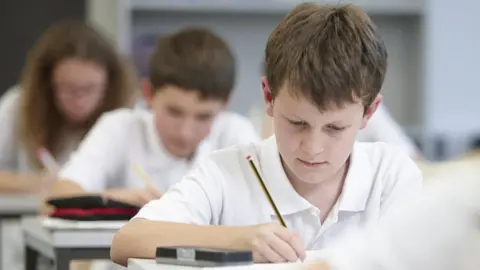Sats: Schools minister says tests shouldn't be too hard
 Getty Images
Getty ImagesThe government does not want Sats tests to be "too hard for children", England's schools minister has said - after claims a Year 6 reading paper was so difficult it left pupils in tears.
Nick Gibb said the assessments had to "test a range of ability" but he would look at the paper because of the concerns.
He said he looked at the tests each year once they were publicly available.
There is no suggestion there will be any kind of formal review.
Last week, one head teacher said the reading test included some "GCSE-level" questions.
It has fuelled a debate among teachers and parents about the purpose of Sats.
The Department for Education (DfE) previously told BBC News that Sats were "designed to be challenging".
Ministers will not have access to the reading paper before it becomes publicly available next week.
Mr Gibb said the Standards and Testing Agency (STA) - which is part of the DfE - tested the paper last year "with a large group of children".
"They monitored the response of those children to the test, to the questions, they found that 85% [enjoyed] taking the test," he said.
He said Sats "do have to test a range of ability to make sure that we can show what proportion of children are exceeding the standard".
"But we don't want these tests to be too hard for children. That's not the purpose," he said.
"The purpose is to test the range of ability and the Standards and Testing Agency is charged with making sure that these tests are appropriate for this age group."
He added: "I will certainly look at this because I know that there has been concern expressed by some schools."
What are Sats?
Standard Assessment Tests, or Sats, are tests that children take in Year 6, at the end of Key Stage 2. They are national curriculum assessments in English grammar, punctuation and spelling, English reading and maths.
The government's Standards and Testing Agency says the purpose of Sats tests are to:
- help measure pupils' progress
- identify if they need any extra help in certain areas
- assess schools' performances
- produce national performance data.
Children also sit Sats in Year 2, at the end of Key Stage 1.
Last year, 59% of Year 6 pupils met the expected levels in reading, writing and maths - down from 65% in 2019.
The national curriculum tests were cancelled in 2020 and 2021, during the pandemic.
